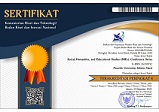The Effectiveness of Full Day School Learning Management on Students' Academic Achievement
Abstract
Improving the quality of basic education has become a primary focus in addressing the challenges of a rapidly changing era. One of the efforts to achieve this is through the implementation of the Full Day School system, which provides extended learning time to optimize the learning process. This study aims to: (1) describe the planning of effective learning management in the Full Day School system at SDIT Nur Hidayah Surakarta, (2) analyze the learning methods applied in Full Day School management, and (3) measure the impact of Full Day School implementation on students’ academic achievement. This research employs a qualitative approach with a case study method. Data collection techniques include observation, in-depth interviews, and documentation, and the data were analyzed through data reduction, data presentation, and conclusion drawing. The results show that: (1) learning planning is carried out systematically through the preparation of annual programs, semester programs, and daily lesson plans that take into account students' characteristics and the school’s vision; (2) the learning methods applied include an integrated thematic approach, active learning strategies, and the use of digital media, all of which promote optimal student engagement; and (3) the implementation of Full Day School management has a positive impact on academic achievement, indicated by increased student scores, higher learning motivation, and more active classroom participation. These findings reinforce that effectively designed Full Day School management contributes significantly to improving students’ learning outcomes.
Keywords
Full Day School, Learning Management, Academic Achievement,Elementary School
Full Text:
PDFRefbacks
- There are currently no refbacks.





